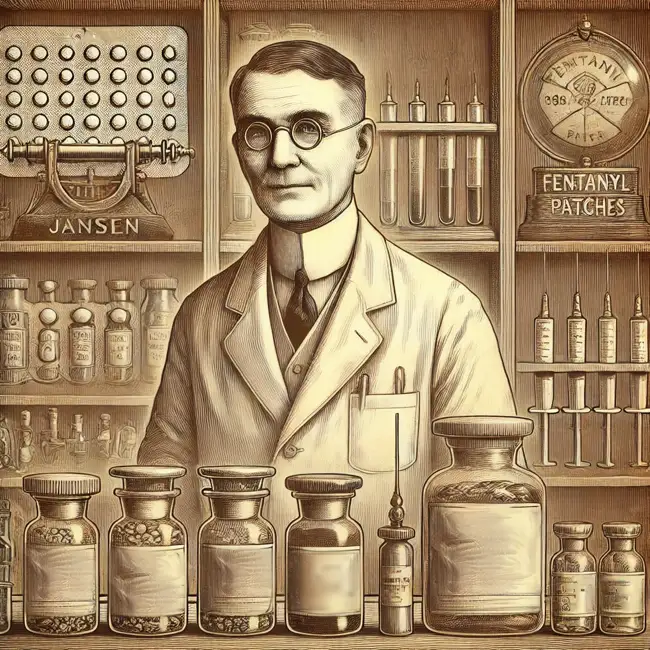Fentanyl Addiction and Recovery
Struggling with an addiction to Fentanyl? Learn more about our recovery programs and start your journey to freedom.
Fentanyl is an extremely potent synthetic opioid commonly prescribed to manage severe pain, especially for people with chronic conditions. However, its potency has also made it highly addictive, leading to widespread misuse and dangerous health consequences. Fentanyl addiction can develop quickly due to the drug’s powerful effects on the brain, creating both physical and psychological dependence.
Understanding Fentanyl Addiction
Fentanyl Effects on Humans
Fentanyl has a significant impact on the human body, especially when used over a prolonged period. Its potency makes it highly effective in pain management, but it also leads to rapid Fentanyl tolerance, meaning individuals need increasingly higher doses to achieve the same effect. This can result in physical dependence on Fentanyl, where the body becomes reliant on the drug to function normally. Psychological effects are equally severe, with users experiencing Fentanyl cravings and compulsive drug-seeking behavior. Additionally, the misuse of Fentanyl patches can lead to dangerous health complications. Many people wonder, “Can Fentanyl be absorbed through the skin?” The answer is yes, which is why Fentanyl patches are often abused, resulting in overdose risks.

The History of Fentanyl
Fentanyl, a synthetic opioid, was first developed in 1960 by Dr. Paul Janssen. It was originally created to provide relief for patients undergoing surgery or experiencing severe pain, such as cancer patients. Due to its effectiveness in managing pain, Fentanyl quickly became a go-to option in medical settings. It is around 50 to 100 times more potent than morphine, making it incredibly effective at low doses. Over the decades, its use expanded, with Fentanyl being made available in several forms, including tablets, lozenges, injections, and Fentanyl patches. These patches became particularly popular for long-term pain relief as they deliver a controlled release of Fentanyl over time, absorbed through the skin.

Fentanyl Potency and Addiction Potential
Despite its medical benefits, the high potency of fentanyl has also led to serious issues with misuse and addiction. The drug’s extreme strength makes it easy for users to develop fentanyl tolerance, where they need increasingly larger doses to achieve the same pain-relieving effects. The drug also leads to severe psychological dependence, as individuals may begin to crave the euphoric effects of the drug rather than using it solely for pain management.
Fentanyl’s role in the opioid epidemic became more pronounced in the 2000s, as reports of its misuse and associated deaths surged. Illegally manufactured Fentanyl began appearing on the streets, often mixed with heroin, cocaine, or counterfeit prescription pills, increasing the risk of fatal overdoses. Many users were unaware they were consuming Fentanyl, leading to an alarming spike in opioid-related deaths. In fact, the rise of synthetic opioids like Fentanyl has been one of the key drivers of overdose fatalities in the U.S. in recent years.
Fentanyl Forms and Variations
While prescribed Fentanyl patches and other forms of the drug remain valuable tools for managing severe pain, the illicit production and misuse of Fentanyl have turned it into a major public health crisis. In addition to causing thousands of deaths due to overdose, Fentanyl addiction is notoriously difficult to overcome due to the rapid onset of Fentanyl physical dependence and intense Fentanyl cravings that users experience when trying to quit.
The question of “Can Fentanyl be absorbed through the skin?” adds to the concerns surrounding its misuse. The answer is yes, which is why Fentanyl patches are highly controlled and come with strict instructions for use. Improper use of these patches, such as chewing or extracting the gel for injection, can lead to rapid absorption of dangerous amounts of the drug, significantly increasing the risk of overdose.

The Opioid Epidemic
As the opioid epidemic continues, Fentanyl’s role in the crisis has expanded, and the need for effective Fentanyl addiction treatment programs has never been more crucial. Addressing both the legitimate medical uses of Fentanyl and its potential for abuse is key to controlling this powerful drug and mitigating its impact on public health.

Symptoms of Fentanyl Addiction
The symptoms of Fentanyl addiction can be both physical and psychological. Individuals struggling with Fentanyl addiction may experience increased tolerance, requiring higher doses to achieve the same pain-relieving effects. Other signs include neglecting personal responsibilities, withdrawing from social activities, and exhibiting compulsive drug-seeking behavior. Fentanyl withdrawal symptoms can include extreme fatigue, nausea, muscle pain, insomnia, and intense cravings, which make it difficult to stop using the drug without professional help. Recognizing these Fentanyl addiction signs is crucial to seeking treatment and beginning the path to recovery.
The Recovery Journey
Recovery is Possible
Recovering from Fentanyl addiction is challenging, but with the right support, it’s entirely achievable. At Dilworth Center, we provide comprehensive Fentanyl addiction treatment programs that address both the physical and psychological aspects of dependence. Whether you’re facing the discomfort of Fentanyl withdrawal or struggling with the mental and emotional side effects of addiction, our specialized care helps guide you through each step of the recovery process.

Recovery Expectations
Recovering from Fentanyl addiction is a journey that involves both physical and psychological challenges, but with the right support and guidance, long-term sobriety is possible. At Dilworth Center, we offer a structured approach to help individuals overcome Fentanyl dependence and manage the various stages of recovery. Here’s what you can expect throughout your recovery journey.

The First 30 Days : After Medical Detox if Necessary
Because of the intensity of Fentanyl withdrawal, the first stage of recovery usually begins after a medically supervised detox, provided through one of our trusted medical partners. Once this step is complete, our outpatient programs provide structured care, helping people manage lingering symptoms and begin building stability in everyday life.

Days 31-90: Building a Foundation for Fentanyl Recovery
After the initial detox phase, the physical symptoms of withdrawal start to subside, but psychological challenges can persist. During this phase, individuals often experience cravings, depression, and anxiety as they adjust to life without Fentanyl. Therapy becomes a key focus, with Fentanyl counseling and behavioral therapy helping to address the underlying emotional and mental health issues that may have contributed to the addiction. Developing coping mechanisms to handle stress and triggers is essential during this stage.

Days 90-180: Strengthening Recovery Skills
At this point, the physical withdrawal symptoms of Fentanyl addiction are typically gone, but the psychological effects may still persist. During this phase, the emphasis is on developing new, healthy habits and reinforcing positive behaviors. People may focus on repairing relationships, setting personal and professional goals, and continuing therapy. In addition, participating in Fentanyl support groups and ongoing counseling is crucial in preventing relapse and strengthening the skills learned in early recovery.

Days 180-365: Achieving Long-Term Goals
As individuals approach the one-year mark of sobriety, the focus turns toward maintaining recovery and continuing personal growth. By now, many of the acute challenges of Fentanyl cessation have been addressed, but relapse prevention remains a priority. During this phase, individuals continue to develop life skills and strengthen their support networks. Therapy and relapse prevention strategies are essential to ensure that the individual stays on track and continues to live a drug-free life. Ongoing participation in Fentanyl recovery programs and support groups helps individuals stay connected and accountable as they navigate the challenges of long-term recovery.
Beyond the First Year
Reaching the one-year milestone in recovery from Fentanyl addiction is a significant achievement. After the first year, the focus shifts toward maintaining sobriety, fostering personal growth, and building a healthy life without substance dependence. Ongoing participation in support groups and therapy is crucial. Setting new life goals and maintaining a balanced lifestyle are key to long-term recovery. Dilworth Center offers support beyond the first year to help individuals stay on the path to long-term recovery and fulfillment.

Family Support for Fentanyl Addiction Recovery
Family Support
At Dilworth Center, we understand the important role that family plays in the recovery process from Fentanyl addiction. Addiction doesn’t just affect the individual; it impacts the entire family, often causing stress, confusion, and emotional pain. Our family support programs are designed to help loved ones navigate the challenges of addiction, providing them with the education and tools needed to effectively support their family member’s recovery journey.


Understanding Fentanyl and Its Impact on Families
Fentanyl addiction can have devastating effects on family dynamics. Many families struggle to understand how such a powerful substance can create both psychological and physical dependence, leaving their loved one unable to quit despite the serious health risks. The emotional strain that addiction places on families can lead to frustration, helplessness, and even resentment. Additionally, witnessing the dangerous withdrawal symptoms and ongoing cravings can be incredibly distressing for family members. Without the right guidance, family relationships may become strained, and the recovery process for the individual becomes even more difficult.
Involving the Family in the Recovery Process
At Dilworth Center, we believe family involvement is crucial for successful recovery. Our program includes family therapy for drug addiction, providing a safe space for family members to express concerns, ask questions, and learn how to support their loved one’s recovery. A dedicated family addiction therapist leads these sessions, helping rebuild trust and communication while educating family members about the complexities of Fentanyl addiction. Our family addiction support services offer ongoing resources and guidance to ensure families remain an integral part of the recovery process, strengthening the support network around the individual and increasing their chances of long-term sobriety.

Dilworth Center Services
Recovering with Dilworth Center
At Dilworth Center, we provide comprehensive care for Fentanyl addiction. Our tailored programs address physical and psychological needs, offering individual counseling, group therapy, and family involvement. We focus on relapse prevention and empowering individuals with healthy coping mechanisms. Our holistic approach also addresses underlying mental health issues. Our dedicated team is here to support your recovery every step of the way.

Take the First Step Toward Lasting Fentanyl Recovery
Are you ready to overcome Fentanyl addiction? Our expert team at Dilworth Center is here to support you on your path to sobriety. Discover personalized treatment plans that empower long-term recovery. Don’t wait—reach out today and start your journey toward a healthier, Fentanyl-free life.

Dilworth Center Treatment Programs

Adult Intensive Outpatient Program (IOP) for Fentanyl Addiction
For individuals seeking a flexible yet structured approach to overcoming Fentanyl addiction, Dilworth Center’s Adult Intensive Outpatient Program (IOP) provides the perfect solution. For more than 35 years, Dilworth Center has offered outpatient programs in Charlotte that support adults working to overcome Fentanyl use. As a nonprofit, CARF-accredited provider and NAATP member, we focus on practical recovery skills, counseling, and relapse prevention strategies that help adults move forward with confidence.
Our IOP stands out among outpatient drug rehab centers near me because of its personalized approach. Each patient receives a tailored treatment plan that includes individual therapy, group counseling, and education on relapse prevention strategies. Our goal is to help patients build a foundation for long-term recovery in a supportive environment.
Our Adult IOP is designed for people balancing family, work, and recovery. With individual therapy, group sessions, and relapse prevention education, patients gain the tools they need to sustain long-term recovery from Fentanyl.

Young Adult Intensive Outpatient Program (IOP) for Fentanyl Addiction
For young adults struggling with Fentanyl addiction, Dilworth Center’s Young Adult Intensive Outpatient Program (IOP) provides specialized care designed to meet their unique needs. As one of the leading options for drug rehabilitation for young adults, our program offers a supportive and structured environment that allows young adults to continue their daily responsibilities while receiving the treatment they need to overcome addiction.
Our young adult rehab program is tailored to address the specific challenges faced by young people, such as navigating peer pressure, building independence, and managing emotional health. Through individual therapy, group counseling, and life skills development, our program helps young adults break free from addiction and build a foundation for long-term recovery.
As one of the top young adult drug treatment centers, Dilworth Center is committed to helping young adults reclaim control of their lives. Our program equips them with the tools and strategies needed to manage cravings, prevent relapse, and pursue a future free from Fentanyl addiction.

Adolescent Intensive Outpatient Program (IOP) for Fentanyl Addiction
At Dilworth Center, we understand the unique challenges that teenagers face when struggling with Fentanyl addiction. Our Adolescent Intensive Outpatient Program (IOP) offers a specialized approach to drug rehabilitation for teenagers, providing a structured, supportive environment that allows teens to continue their education while receiving the treatment they need.
As a trusted teenager rehab program, we focus on addressing both the physical and emotional aspects of addiction. Through personalized therapy sessions, group counseling, and family involvement, we help teens develop healthy coping mechanisms and understand the risks of substance use. Our approach also emphasizes the importance of family support in the recovery process, helping to rebuild trust and communication within the family unit.
Dilworth Center is dedicated to being a top choice for teen rehabilitation, providing the tools and resources teenagers need to overcome Fentanyl addiction. Our adolescent IOP allows teens to recover in a safe and caring environment, surrounded by professionals committed to their long-term success.

Family Program for Fentanyl Addiction
At Dilworth Center, we firmly believe that the family plays a pivotal role in the recovery process. We understand that addiction affects not only the individual but also their loved ones, creating emotional turmoil and strained relationships. Our Family Program is designed to provide family addiction support, helping families understand addiction and teaching them how to support their loved one’s recovery best.
Through family addiction therapy, we offer structured sessions where family members can learn about the complexities of addiction, communicate openly, and heal together. Guided by an experienced family addiction therapist, these sessions focus on rebuilding trust, improving communication, and developing healthy boundaries. Family members also receive education on supporting their loved one’s sobriety in practical and emotional ways.
Our family addiction support services at Dilworth Center are integral to the recovery process, ensuring that both the individual and their family are equipped with the tools and resources needed for long-term success. By participating in our Family Program, families become a vital source of encouragement and strength, helping their loved ones navigate the challenges of Fentanyl addiction recovery.

Mental Health Program (Dual Diagnosis) for Fentanyl Addiction
At Dilworth Center, we recognize that many individuals struggling with Fentanyl addiction also face co-occurring mental health disorders, such as anxiety, depression, or PTSD. Our dual-diagnosis treatment centers are designed to address both the addiction and the underlying mental health conditions simultaneously. Treating both issues together is essential for a successful, long-term recovery.
As one of the leading dual-disorder treatment centers, we provide comprehensive care that integrates mental health therapy with addiction treatment. Our team of professionals addresses the complexities of co-occurring disorders, ensuring that each patient receives a personalized approach to their recovery. This holistic treatment helps individuals manage the emotional triggers that may have contributed to their addiction while also developing strategies to cope with their mental health challenges.
Through our dual-diagnosis addiction treatment centers, we offer a structured program that includes individual therapy, group counseling, medication management, and relapse prevention strategies. By addressing both the mental health and addiction aspects of recovery, we help individuals achieve long-lasting sobriety and improved overall well-being.

Relapse Prevention Program for Fentanyl Addiction
Maintaining sobriety after overcoming Fentanyl addiction requires a comprehensive plan to manage triggers and prevent relapse. At Dilworth Center, our relapse prevention program is designed to provide individuals with the tools and strategies necessary to stay on the path to recovery. We work closely with each patient to develop personalized relapse prevention plans, addressing their unique challenges and triggers.
Our program emphasizes practical relapse prevention strategies, such as identifying high-risk situations, creating healthy routines, and building a solid support network. These strategies empower individuals to navigate daily life without relying on substances like Fentanyl. By participating in relapse prevention therapy, patients gain the skills needed to manage cravings, reduce stress, and avoid relapse.
At Dilworth Center, we are committed to helping individuals achieve sobriety and maintain it long-term. Our relapse prevention program plays a critical role in ensuring that individuals are equipped to handle the ups and downs of recovery, giving them the best chance for a successful, drug-free future.










